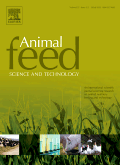
ANIMAL FEED SCIENCE AND TECHNOLOGY
Scope & Guideline
Advancing the Science of Animal Nutrition
Introduction
Aims and Scopes
- Animal Nutrition and Dietetics:
Research dedicated to understanding the nutritional requirements of various livestock species and optimizing diets to enhance growth, reproduction, and overall health. - Feed Formulation and Additives:
Studies focusing on the formulation of animal feeds, including the use of alternative ingredients, feed additives, and supplements to improve feed efficiency and animal performance. - Sustainable Feeding Practices:
Exploration of sustainable feeding strategies and the utilization of by-products and alternative protein sources to reduce environmental impact and enhance resource efficiency in animal production. - Digestibility and Nutrient Utilization:
Investigations into the digestibility of various feed ingredients and the efficiency of nutrient absorption in different animal species. - Impact of Feed on Animal Health:
Research examining the effects of specific dietary components on animal health, immunity, and disease resistance. - Innovative Feed Technologies:
Development and assessment of innovative processing methods and technologies aimed at improving feed quality and safety. - Microbiome and Gut Health:
Studies focusing on the interplay between diet, gut microbiota, and animal health, including the effects of prebiotics, probiotics, and other dietary components.
Trending and Emerging
- Alternative Protein Sources:
There is a growing trend towards the exploration of alternative protein sources, such as insect meal and plant-based proteins, to meet the protein demands of livestock while addressing sustainability concerns. - Precision Nutrition:
Emerging research focuses on precision nutrition, utilizing technology and data analytics to tailor diets based on individual animal needs and responses, enhancing efficiency and health outcomes. - Functional Ingredients and Nutraceuticals:
Increased interest in the role of functional ingredients and nutraceuticals that promote health and performance, including phytogenics and bioactive compounds, is evident in recent publications. - Environmental Impact Mitigation:
Research is increasingly addressing the environmental impact of animal feeding practices, including studies on reducing methane emissions and improving the sustainability of feed ingredients. - Gut Health and Microbiome Research:
There is a notable increase in studies investigating the gut microbiome's role in animal health and performance, emphasizing the importance of diet in shaping microbial communities. - Waste Utilization and By-products:
Research on the utilization of agricultural and food industry by-products as feed ingredients is gaining momentum, promoting sustainability and circular economy principles.
Declining or Waning
- Traditional Protein Sources:
The use of conventional protein sources such as fishmeal and soybean meal is declining as researchers explore more sustainable and alternative protein sources, such as insects and microbial proteins. - Conventional Feed Additives:
Interest in traditional feed additives, such as antibiotics, is waning due to increasing regulations and a shift towards natural alternatives that promote gut health and reduce antibiotic resistance. - Basic Feed Chemistry:
While foundational studies on feed chemistry remain important, there is a noticeable decline in publications focusing exclusively on basic chemical analysis, as the field moves towards more applied and interdisciplinary approaches. - Ruminant Nutrition Focus:
There has been a gradual shift away from ruminant-specific nutrition studies towards a broader focus on monogastric animals and aquaculture, reflecting changing agricultural practices and market demands. - Generalized Feeding Strategies:
Research on one-size-fits-all feeding strategies is decreasing as more personalized and species-specific approaches to nutrition gain traction.
Similar Journals
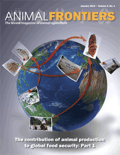
Animal Frontiers
Connecting Researchers to Shape the Future of Animal ScienceAnimal Frontiers, published by Oxford University Press Inc, stands as a premier open-access journal dedicated to advancing the field of animal science and zoology. Since its establishment in 2011, this journal has garnered impressive significance, achieving a Q1 ranking in both Animal Science and Zoology and Food Animals categories as of 2023, placing it at the forefront of research in these critical areas. With a Scopus ranking of #25 out of 490 in Agricultural and Biological Sciences and an exceptional #4 out of 39 in Veterinary Food Animals, it caters to a diverse audience of researchers, professionals, and students dedicated to animal welfare, food security, and sustainable practices. The journal's mission is to provide a high-impact platform for innovative research and discussions that enhance our understanding of animal health and productivity globally. Proudly based in India, Animal Frontiers is committed to maintaining rigorous academic standards while ensuring accessibility to vital research findings, making it an invaluable resource in the scientific community.

CZECH JOURNAL OF ANIMAL SCIENCE
Unlocking Insights in Animal Science and AgricultureThe Czech Journal of Animal Science, published by the Czech Academy Agricultural Sciences, is a premier open-access journal dedicated to advancing research in the fields of animal science and zoology. With an impressive ranking of Q2 in its category for 2023, it underscores its significance within the academic community, evidenced by its Scopus rank of #197 out of 490 in Animal Science and Zoology, placing it in the 59th percentile among peers. The journal has been a crucial platform for scholarly communication since its inception and has embraced open access since 2004, ensuring that research is widely available to a global audience. Targeted toward researchers, professionals, and students, the journal publishes high-quality original research, review articles, and case studies that contribute to the understanding and enhancement of animal science practices. Its commitment to rigorous peer review and its broad scope undoubtedly solidify its role as an essential resource for those engaged in animal research and agriculture, fostering continued innovation and knowledge transfer in this vital sector.

Translational Animal Science
Exploring the Frontiers of Animal Science and Veterinary InnovationsTranslational Animal Science, published by Oxford University Press Inc, stands as a prominent journal in the fields of Animal Science and Zoology as well as Veterinary Sciences, achieving a commendable Q2 ranking in both categories for 2023. With an E-ISSN of 2573-2102 and transitioning to an Open Access model since 2017, this journal fosters accessibility and dissemination of vital research that bridges the gap between basic animal science and its practical applications. The journal's significant impact factor, where it ranks in the 71st and 65th percentiles respectively for Veterinary and Agricultural and Biological Sciences disciplines, highlights its importance as a resource for emerging trends and innovations in animal research. With submissions accepted until 2024, Translational Animal Science not only contributes to advancing knowledge but also aims to engage a broad audience of researchers, professionals, and students dedicated to improving animal health and welfare. Based in India, the journal serves as an essential platform for the exchange of scientific ideas that facilitate progress within these vital fields.

Indian Journal of Animal Research
Pioneering Research in Animal Science and Veterinary MedicineIndian Journal of Animal Research is a prominent publication in the field of animal science and veterinary medicine, established to advance the understanding of animal husbandry, biology, and health. Published by the AGRICULTURAL RESEARCH COMMUNICATION CENTRE, this journal has been contributing to the scholarly discourse since 2008, with a commitment to high-quality research dissemination. With its current Q3 ranking in both Animal Science and Zoology and Veterinary (miscellaneous) categories, it serves as a crucial platform for researchers aiming to share insights and innovations within these disciplines. Although it operates without open access, it remains widely recognized, fostering a collaborative academic environment. The journal's impact is underscored by its presence within the Scopus database, providing valuable rankings in both General Veterinary and Animal Science and Zoology fields. Researchers, professionals, and students interested in veterinary advancements and animal research will find this journal a valuable resource for the latest scientific findings and discussions. Join the community of scholars igniting progress in the vital realm of animal research.
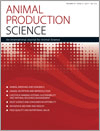
Animal Production Science
Innovating Insights for Food Security and Animal WelfareAnimal Production Science, published by CSIRO PUBLISHING, is a prestigious journal that caters to the fields of Animal Science and Food Science. With an ISSN of 1836-0939 and an E-ISSN of 1836-5787, the journal features high-quality research and reviews that are crucial for advancing the understanding and innovation of animal production systems. Recognized within the Q2 category of both Animal Science and Zoology, and Food Science, as per the 2023 Journal Rankings, Animal Production Science has achieved commendable Scopus rankings, placing it in the 68th and 48th percentiles in its respective categories. With converged years from 2009 to 2024, and an aim to disseminate knowledge that promotes sustainable practices, the journal is pivotal for researchers, professionals, and students devoted to animal production and food security. Exploring topics from livestock management to food quality, the journal offers valuable insights for enhancing productivity while considering welfare and environmental impact. For those seeking accessibility, the journal provides various open access options, encouraging a wider reach of its scholarly articles.
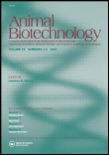
ANIMAL BIOTECHNOLOGY
Exploring the Frontiers of Animal BiotechnologyANIMAL BIOTECHNOLOGY is a premier journal published by Taylor & Francis Inc, dedicated to fostering innovative research in the field of animal biotechnology. With an ISSN of 1049-5398 and an E-ISSN of 1532-2378, this journal has established itself as a significant platform for scholars and professionals looking to advance their understanding of biotechnological applications in animal science. Since its inception in 1990, ANIMAL BIOTECHNOLOGY has garnered attention, currently ranking in the Q2 category for Animal Science and Zoology and Q3 in both Bioengineering and Biotechnology, reflecting its valuable contributions to these evolving fields. Researchers looking to publish their work can benefit from the journal's esteemed reputation, further emphasized by its Scopus rankings, which place it in the top tiers of relevant categories. While the journal does not currently offer open access, its essential body of knowledge serves as a crucial resource for anyone involved in animal biotechnological research, including academics, industry professionals, and students aiming to deepen their expertise and drive innovation within this exciting domain.
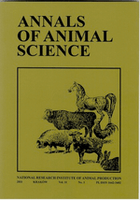
Annals of Animal Science
Connecting Professionals Through Open Access KnowledgeAnnals of Animal Science is a prestigious academic journal, published by Walter de Gruyter GmbH in Germany, specializing in the multifaceted field of Animal Science. With an ISSN of 1642-3402 and an E-ISSN of 2300-8733, this journal is recognized for its high-impact contributions, holding a commendable impact factor that demonstrates its relevance in nurturing quality research. The journal has garnered Q2 rankings in 2023 across various categories including Animal Science and Zoology, Food Animals, and Small Animals. Notably, its Scopus Rankings indicate an elite standing, with the journal placing in the top 10% within its specific fields. Covering converged years from 2008 to 2024, the Annals of Animal Science serves as an essential platform for researchers, professionals, and students to disseminate knowledge and advance studies related to animal health, welfare, and production. The journal also emphasizes open access, promoting broader accessibility to foster collaboration and innovation in Animal Science globally. For those committed to advancing their understanding of veterinary and agricultural sciences, this journal is a vital resource.
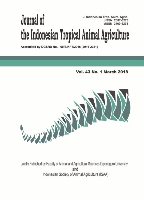
Journal of the Indonesian Tropical Animal Agriculture
Nurturing the Future of Tropical Animal HusbandryJournal of the Indonesian Tropical Animal Agriculture is an esteemed peer-reviewed journal published by UNIV DIPONEGORO, focusing on the dynamic fields of animal science and veterinary medicine. Since its inception in 2009, the journal has maintained an open access policy, ensuring that valuable research is freely available to the global scientific community. Based in Indonesia, the journal has adapted to the evolving agricultural landscape and now contributes significantly to both local and international discourse on tropical animal husbandry. With a Scopus rank placing it within the 36th percentile for general veterinary sciences and the 25th percentile for animal science and zoology, it is emerging as a valuable resource for researchers and professionals alike. The journal covers a broad range of topics within its scope, fostering innovative approaches and solutions tailored to the unique challenges of the tropical environment. By exploring critical issues in animal agriculture, this journal not only enhances academic knowledge but also supports sustainable practices within the industry. We invite researchers, students, and professionals in the realm of veterinary science and animal agriculture to engage with the rich array of research presented in this journal.
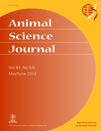
ANIMAL SCIENCE JOURNAL
Pioneering Research in Animal Science and ZoologyAnimal Science Journal, published by Wiley, stands as a premier platform for advancing knowledge in the fields of Agricultural and Biological Sciences, Animal Science and Zoology, and Food Science. With an ISSN of 1344-3941 and an E-ISSN of 1740-0929, this journal not only enjoys a commendable Q2 ranking across multiple categories, reflecting its significance and impact within the academic community, but it also ranks within the top percentiles in terms of Scopus rankings. Operating out of the United Kingdom, the journal covers a broad spectrum of research topics relevant to animal science, encompassing both theoretical insights and practical applications. While it is not an open access journal, it remains an essential resource for researchers and practitioners eager to enhance their understanding of animal sciences, contribute to ongoing debates, and stay abreast of the latest findings from 2003 through 2024. Scholar engagement and innovative research are central to the journal’s objectives, making it an invaluable asset for students, professionals, and academics alike.

Animal Bioscience
Shaping Tomorrow's Animal Welfare Through ResearchAnimal Bioscience is a premier journal dedicated to advancing the field of animal science, published by the esteemed ASIAN-AUSTRALASIAN ASSOCIATION OF ANIMAL PRODUCTION SOCIETY. With an impactful presence in South Korea, this journal serves as a pivotal platform for disseminating high-quality research in animal production, nutrition, genetics, and veterinary sciences. Its notable standing is reflected in its categorization within the Q1 quartile for Animal Science and Zoology and Veterinary (miscellaneous) disciplines, highlighting the journal's dedication to excellence and relevance. Additionally, Animal Bioscience has secured impressive rankings in various related fields, with a 94th percentile position in general veterinary studies. As an Open Access publication, it encourages broad distribution and engagement with its content, making significant contributions to the global discourse surrounding animal technology and welfare. This journal is an invaluable resource for researchers, professionals, and students aiming to deepen their understanding and promote innovations in animal biosciences.